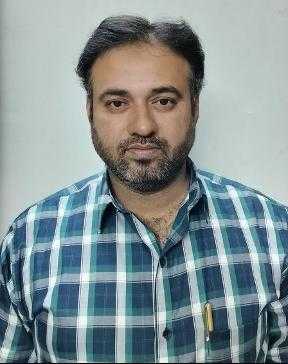
Expert Physiotherapy at Home
Certified physiotherapists visit you at home to provide focused, one-on-one care tailored to your needs. With no travel or waiting rooms, recovery happens in a setting that is comfortable, familiar, and built around your convenience.
Personalised Recovery Programmes
Every treatment plan is designed to suit your condition, goals, and pace. Our physiotherapists follow structured, evolving protocols to ensure consistent progress, with each session aligned to deliver meaningful results.
Trusted Physiotherapists. Real Results.
Our team comprises experienced, background-verified physiotherapists trusted by thousands of families. With a strong focus on safety, reliability, and clinical outcomes, we make recovery at home both effective and reassuring
Patient Testimonials
Portea Physiotherapists for Home Visits
Meet some of our experienced and dedicated healthcare professionals

Dr. Lokesh G
Physiotherapist
Specializations
Experienced in Neurological rehabilitation, Orthopaedic physiotherapy, and Paediatric care
Delivers structured, high-impact treatment plans across neuro, ortho, and paediatrics—ensuring safety, comfort, and measurable recovery at every stage.

Dr. Mohammed Sarwar
Physiotherapist
Specializations
Experienced in Neurological rehabilitation, Adult physiotherapy, and Paediatric care
Combines deep clinical expertise with a compassionate approach, supporting both adults and children through neuro and physical rehabilitation that promotes long-term independence and recovery.

Dr. Nelapati Divya
Physiotherapist
Specializations
Skilled in Orthopaedic rehabilitation, Manual therapy techniques, and Paediatric physiotherapy
Brings a personalised, hands-on approach to healing—combining structural expertise with paediatric sensitivity to restore movement, relieve pain, and improve everyday function.

Dr. Naveen V
Physiotherapist
Specializations
Trained in Pain management, Cardiac and Orthopaedic rehabilitation, Neurological care, and Neural tissue mobilisation
Brings clinical precision and empathy together—designing science-backed recovery protocols for pain relief, nerve mobilisation, and cardio-neuro-ortho rehabilitation across all age groups

Dr. Miloni Savla
Physiotherapist
Specializations
Holds an MPT in Orthopaedics with a focus on Musculoskeletal rehabilitation and strength recovery
Delivers focused, movement-oriented therapy grounded in orthopaedic science—helping patients rebuild strength, restore function, and return to daily life with confidence
Other Cities
Physiotherapy Treatments

what are the early clinical signs of myasthenia gravis?
Myasthenia Gravis primarily affects muscles that control eye movement, facial expressions, chewing, swallowing, and breathing. Common symptoms include drooping eyelids (ptosis), difficulty swallowing (dysphagia), slurred speech, and generalized muscle weakness. The condition tends to worsen with activity and improve with rest. Severe cases can lead to myasthenic crises, which require emergency medical intervention due to respiratory failure.
what are the autoimmune and neuromuscular causes of myasthenia gravis?
MG is caused by an immune system malfunction in which antibodies attack the acetylcholine receptors at the neuromuscular junction, preventing proper muscle contraction. In some cases, the thymus gland plays a role in triggering the autoimmune response. While the exact cause of MG remains unclear, genetic predisposition and environmental factors may contribute to its development.
what are the risk factors for developing myasthenia gravis?
The primary risk factors for Myasthenia Gravis include age, gender, and genetic susceptibility. MG is more common in younger women (under 40) and older men (over 60). Certain medications, infections, and other autoimmune diseases can also trigger or exacerbate symptoms. Without proper management, MG can lead to complications such as difficulty breathing, severe muscle fatigue, and life-threatening myasthenic crises.
how can myasthenia gravis be prevented and managed early?
Since Myasthenia Gravis is an autoimmune condition, direct prevention is not possible. However, early diagnosis and appropriate treatment can help manage symptoms and prevent severe complications. Avoiding known triggers, managing stress, and maintaining a healthy immune system can contribute to better disease control. Regular medical check-ups and lifestyle modifications can also help individuals cope with the condition effectively.
what are the diagnosis and medical treatment methods for myasthenia gravis?
Diagnosing MG involves a combination of clinical examinations, blood tests to detect anti-acetylcholine receptor antibodies, electromyography (EMG), and the edrophonium test. Imaging tests like CT or MRI scans may be conducted to assess thymus abnormalities. Treatment options include cholinesterase inhibitors (such as pyridostigmine) to improve communication between nerves and muscles, corticosteroids, immunosuppressants, and, in some cases, thymectomy (surgical removal of the thymus gland). Plasmapheresis and intravenous immunoglobulin (IVIG) therapy may be used during severe exacerbations.
physiotherapy management in myasthenia gravis treatment
Physiotherapy is an essential part of managing Myasthenia Gravis by improving muscle endurance, reducing fatigue, and maintaining functional independence. Controlled exercise programs, including respiratory muscle training and mild resistance exercises, help strengthen muscles without overexertion. Postural training and balance exercises assist in preventing falls, while relaxation techniques aid in managing stress, which can worsen symptoms. Physiotherapists design personalized rehabilitation programs to help patients adapt to their limitations while maximizing their physical abilities.
how portea supports myasthenia gravis physiotherapy at home?
At Portea, we understand the challenges of living with Myasthenia Gravis. Our home-based physiotherapy services are tailored to the specific needs of each individual, providing personalized care to help them regain mobility and independence in a safe and supportive environment.
We also specialize in providing expert physiotherapy services for post-surgical rehab, arthritis, neuro-rehab, sports injury, orthopedic physiotherapy, physiotherapy for the elderly, for respiratory disorders, and more – all delivered conveniently at your home. Our dedicated team ensures you receive the personalized care you need for a smooth and successful recovery.
faq’s
1. How does physiotherapy benefit people with Myasthenia Gravis?
Physiotherapy enhances muscle endurance and functional ability without overexerting the patient. Controlled exercises help manage fatigue and maintain independence while reducing the risk of complications like falls or respiratory issues.
2. What precautions should MG patients take during physiotherapy?
Patients should avoid overexertion and always follow a personalized plan. Monitoring for increased fatigue, resting between sessions, and avoiding exercises during flare-ups are crucial for safe and effective outcomes.
3. Is respiratory physiotherapy important for Myasthenia Gravis?
Yes, respiratory physiotherapy strengthens breathing muscles, which are often weakened in MG. It can prevent respiratory complications, especially in severe cases, and plays a vital role in crisis recovery and long-term lung health.
4. Can physiotherapy prevent myasthenic crises?
While it cannot directly prevent crises, physiotherapy helps improve muscle control and breathing, indirectly reducing the frequency and severity of flare-ups through better physical management and improved resilience.
5. What lifestyle habits support MG physiotherapy outcomes?
Maintaining a consistent sleep schedule, balanced nutrition, hydration, stress management, and following a physiotherapist’s routine all support better outcomes. Avoiding extreme heat and infections also contributes to long-term muscle health.
Doctor Consultation
Nursing
Physiotherapy
Trained Attendant
Elder Care
Mother & Baby Care
Lab Tests
Medical Equipment
Speciality Pharma
Critical Care




